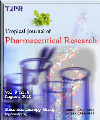
|
Tropical Journal of Pharmaceutical Research
Pharmacotherapy Group, Faculty of Pharmacy, University of Benin, Benin City, Nigeria
ISSN: 1596-5996
EISSN: 1596-5996
Vol. 14, No. 12, 2015, pp. 2187-2192
|
 Bioline Code: pr15287
Bioline Code: pr15287
Full paper language: English
Document type: Research Article
Document available free of charge
|
|
|
Tropical Journal of Pharmaceutical Research, Vol. 14, No. 12, 2015, pp. 2187-2192
| en |
Chloroquinone Inhibits Cell Proliferation and Induces Apoptosis in Nasopharyngeal Carcinoma Cell Lines
Yang, Xin-Qing; Zheng, Hao; Ye, Qing; Li, Rui-Yu & Chen, Yong
Abstract
Purpose: To demonstrate the role of chloroquinone (CQ) in inducing apoptosis in HONE-1 and HNE-1,
nasopharyngeal carcinoma (NPC) cell lines.
Methods: Water-soluble tetrazolium salt (WST)-1 assay was used for the determination of cell
proliferation while an inverted microscope was employed for the analysis of alterations in the
morphology of the cells.
Results: CQ treatment led to a significant reduction in the rate of cell proliferation in NPC cells after 48
h. In HONE-1 and HNE-1 cell lines viability was reduced to 89 and 82 %, respectively on treatment with
10 μΜ concentration of CQ without affecting normal human skin keratinocyte cell line, K38. The
expression of Ki67, a marker for proliferation as well as proliferating cell nuclear antigen (PCNA),
decreased in the CQ-treated NPC cells. Morphological examination of NPC cells revealed cell apoptosis
on treatment with CQ after 48 h. Treatment of NPC cells with CQ induced activation of caspases and
DNA was damaged which further confirmed CQ-mediated induction of apoptosis. The level of apoptotic
cells in CQ-treated and untreated control HONE-1 cell cultures was 53.67 and 3.78 %, respectively (p <
0.05). In addition, CQ treatment decreased reactive oxygen species (ROS) generation in NPC cells.
Conclusion: CQ inhibits cell proliferation of NPC cells by inducing apoptosis via DNA damage, and
may be of therapeutic use for the treatment of NPC. However, this requires clinical investigation to
ascertain its therapeutic potential.
Keywords
Chloroquinone; Caspases; Apoptosis; Nuclear antigen; Nasopharyngeal carcinoma
|
| |
© Copyright 2015 - Tropical Journal of Pharmaceutical Research
Alternative site location: http://www.tjpr.org
|
|
